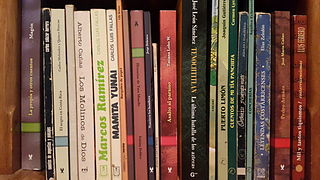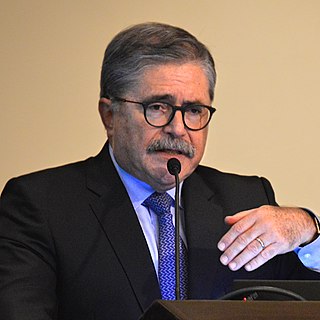
Amplitude modulation (AM) is a modulation technique used in electronic communication, most commonly for transmitting messages with a radio wave. In amplitude modulation, the amplitude of the wave is varied in proportion to that of the message signal, such as an audio signal. This technique contrasts with angle modulation, in which either the frequency of the carrier wave is varied, as in frequency modulation, or its phase, as in phase modulation.

Radio broadcasting is transmission of audio (sound), sometimes with related metadata, by radio waves to radio receivers belonging to a public audience. In terrestrial radio broadcasting the radio waves are broadcast by a land-based radio station, while in satellite radio the radio waves are broadcast by a satellite in Earth orbit. To receive the content the listener must have a broadcast radio receiver (radio). Stations are often affiliated with a radio network which provides content in a common radio format, either in broadcast syndication or simulcast or both. Radio stations broadcast with several different types of modulation: AM radio stations transmit in AM, FM radio stations transmit in FM, which are older analog audio standards, while newer digital radio stations transmit in several digital audio standards: DAB, HD radio, DRM. Television broadcasting is a separate service which also uses radio frequencies to broadcast television (video) signals.

The University of Costa Rica is a public university in the Republic of Costa Rica, in Central America. Its main campus, Ciudad Universitaria Rodrigo Facio, is located in San Pedro Montes de Oca, in the province of San José. It is the oldest and largest institution of higher learning in Costa Rica, originally established as the Universidad de Santo Tomás in 1843. It is also the most important research university in the country and Central America and is counted among the most prestigious universities of Latin America. Approximately 45,000 students attend UCR throughout the year.

Brujas F.C. was a Costa Rican football club, based in Desamparados, Costa Rica.

FM broadcasting is a method of radio broadcasting using frequency modulation (FM). Invented in 1933 by American engineer Edwin Armstrong, wide-band FM is used worldwide to provide high fidelity sound over broadcast radio. FM broadcasting is capable of higher fidelity—that is, more accurate reproduction of the original program sound—than other broadcasting technologies, such as AM broadcasting. It is also less susceptible to common forms of interference, reducing static and popping sounds often heard on AM. Therefore, FM is used for most broadcasts of music or general audio. FM radio stations use the very high frequency range of radio frequencies.
Reynaldo Parks Pérez is a retired international Costa Rican football defender.

The University of Medical Sciences is a private medical university in San José, Costa Rica. It is the largest and oldest private medical school in Costa Rica and one of the most prestigious in Latin America. Currently the main campus is located in the country's capital with the latest technology in medical education and one of the best simulated hospitals in the region. The university offers a great variety of degrees such as Doctor of Medicine, Doctor of Microbiology and Clinical Chemistry, Licentiate of Physiotherapy, Licentiate of Nutrition and Doctor of Pharmacy. UCIMED also offers master's degrees and medical specialties such as a Master's Degree in Health Management and Specialty in Gynecology and Obstetrics.

Asociación Deportiva Ramonense is a Costa Rican football team playing at the top level. It was based in San Ramón, Alajuela. Their home stadium was Estadio Guillermo Vargas Roldán.

La U Universitarios Fútbol Club was a soccer club in Costa Rica.

Costa Rican literature has roots in colonization and is marked by European influences. Because Costa Rica is a young country, its literary tradition is also young. The history of Costa Rican literature dates to the end of the 19th century.
José Antonio Mena Alfaro in Costa Rica is a Costa Rican footballer, who plays for Liga Nacional club Antigua as a defender.

Olman Andrés Vargas López is a Costa Rican footballer who currently plays for La U Universitarios.
Estrella Zeledón Lizano was a Costa Rican public figure who served as the First Lady of Costa Rica from 1978 to 1982 during the presidency of her husband, Rodrigo Carazo Odio. She also served on the Executive Council of the United Nations Educational, Scientific and Cultural Organization (UNESCO) from 1981 until 1985.

General elections were held in Costa Rica in 2018 to elect both the President and Legislative Assembly. The first round of the presidential election was held on 4 February 2018, with the two highest-ranked candidates being Christian singer and Congressman Fabricio Alvarado Muñoz from the conservative National Restoration Party and writer and former Minister Carlos Alvarado Quesada from the progressive Citizens’ Action Party, gaining 24% and 21% of the votes respectively. As no candidate received more than 40% of the first round vote, a second round run-off election was held on 1 April 2018 and was won by Carlos Alvarado Quesada, with a landslide victory of 60.6% of the vote.
The 2017–18 Liga FPD season, also known as Campeonato Banco Popular for sponsorship reasons, is the 97th since its establishment. The tournament is the first since the 2006–07 season to use the Apertura and Clausura names to their short tournaments, marking a departure from the Invierno and Verano tournaments.

Juan Diego Castro Fernández is a Costa Rican lawyer and politician, former Grand Master of the Grand Lodge of Costa Rica. Castro is a Defense lawyer who studied Law and Criminal science at the University of Costa Rica and has a Doctorate degree in Mediation from Universidad La Salle. Castro was Minister of Public Safety between 1994 and 1997 during the presidency of José María Figueres (PLN). He became the first cabinet member to receive a Motion of no confidence by the Legislative Assembly when he summoned police forces to fence off Parliament as a means to press for the reform of the Penal Code. Subsequently, Castro resigned as Minister of Safety and was named Minister of Justice. He unsuccessfully ran for the presidency as the nominee of the conservative-leaning National Integration Party in the 2018 Costa Rican general election. Castro has been compared unfavorably to US President Donald Trump and other right-wing antiestablishment and right-wing populist figures.

Víctor Iván Vargas Blanco is Costa Rican plasma and nuclear fusion physicist. He is renowned for his work in plasma physics and nuclear fusion. Currently, as a professor and tenured researcher at the Costa Rica Institute of Technology, he heads the Plasma Laboratory for Fusion Energy and Applications that he founded in 2011.
The 2019 Costa Rican student protests were a series of protests by Costa Rican high school and university students during 2019, for different reasons.











